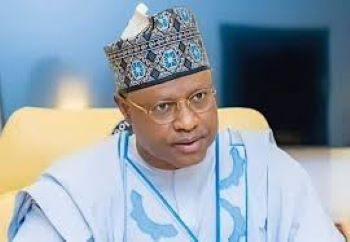The Kaduna State Government said it allocated 9.4 per cent of its 2025 budget, amounting to N74.02 billion to stimulate agriculture and tackle food security challenges.
The state Commissioner for Agriculture, Murtala Dabo, gave the indication at the Ministry’s one-day Sector Coordination Meeting in Kaduna.
The meeting, organised by the Policy and Agricultural Systems Strengthening (PASS) project, aims to coordinate the State Implementation Policy (SIP) on Agriculture for strategic performance.
Dabo, represented by Abubakar Abba, the Permanent Secretary in the ministry, said that the allocation, which represented 9.36 per cent of the 2025 budget was the first in the history of the state.
He said the appropriation was also part of an effort to achieve the MAPUTO DECLARATION which recommended a minimum of 10 per cent annual budgets to the agricultural sector to tackle Africa’s food security challenges.
“This is a significant 9.36% of the state’s total budget moving us closer to achieving the recommended 10% at the 2003 Maputo Declaration on Agriculture and Food Security.
“Agriculture, as you know, is not just a source of livelihood for our people but a cornerstone of our economy.
“The sector remains integral to our vision of achieving food security, economic prosperity, and environmental sustainability.
The State government cannot do it alone.
“As we are all aware, this is a period of great challenges and opportunities for agriculture,” the commissioner said.
According to him, climate change, population growth, and evolving market demands are reshaping the food production ecosystem.
Dabo said the state faced multifaceted challenges that needed a unified approach through strategic collaboration, innovative solutions, and inclusive systems.
He said that collaboration would empower all the stakeholders, from smallholder farmers to policymakers and private sector partners.
The commissioner, while reviewing the 2024 budget performance, said the ministry recorded a 72 per cent performance in the total budget expenditures, with capital expenditure achieving 74.4 per cent.
“Looking ahead, the proposed 2025 budget for the agriculture sector stands at ₦74.02 billion.
“Notably, over ₦70 billion or 95 percent of the sector’s budget has been allocated to capital projects.
“These allocations include transformative initiatives such as:₦10 billion for fertilizer and input intervention;
“₦40.19 billion for access roads to farms under the Rural Access and Agricultural Marketing Project (RAAMP),
“₦14.17 billion for establishing Special Agro-Industrial Processing Zones (SAPZ), and ₦5.11 billion for the Livestock Productivity Resilience Support Project (L-PRES),” he said.
Dabo described the projects as ones requiring effective coordination and collaboration among all stakeholders, including government agencies, development partners, and private sector actors.
“Therefore, I hope that this meeting will provide us a valuable platform for:
“Sharing best practices and lessons learned from past interventions. Identifying key priorities and challenges for the upcoming year,” he said.
The official stressed the need for building consensus on strategies for effective budget utilisation and project implementation.
Dabo said, ” Also the need for strengthening coordination mechanisms to ensure seamless collaboration across the sector.
“With the generous support of the AGRA and technical assistance from Synergos, the meeting accentuates the importance of collaboration and coordination within the agricultural sector.
”I want to use this opportunity to commend the efforts of all stakeholders, including government agencies, and private sector partners.
”Others are development organisations, and civil society groups, for their unwavering support in driving agricultural transformation in Kaduna State.
“Your commitment reflects a shared vision of building a resilient, inclusive, and productive agricultural sector that benefits all.”
He urged the stakeholders to ensure that policies and systems not only remain robust but also responsive to the needs of the people.
Dabo said, “Once again, I thank the PASS Project and AGRA for their leadership and support.”
Meanwhile, the Technical Assistant of the programme, Mr Victor Adejoh said at an event that the AGRA-funded it aimed to develop the skills and capabilities required to promote the transformation of smallholder-based agriculture in the state.
Adejoh, also Country Director of SYNERGOS Nigeria, said it was facilitating the process to ensure its success in the state.
He said the overall objective of the project would strengthen inclusive coordination of agricultural transformation, food systems, and market development in the sector.
The technical assistant presented three agriculture sector policies due for approval by the state government.
The policies included the Contract Policy, Gender Farming and Soya Bean Farming Policies were presented to the participants.
The News Agency of Nigeria (NAN) the ministry also unveiled the State Implementation Plan that would enhance easy transition to agri-businesses.
The PASS project coordinating meeting attracted the participants from various organisations in the sector and including the civil society groups.
The CSOs and other stakeholders, however, said the funds allocated to the agriculture sector were still not adequate to attract the needed investment in the sector.
Some of those who spoke at the event said the amount was not adequate, considering the 34 per cent current inflation rate and the depreciating value of the Naira.
They urged the state government to cut down some of its proposed expenditures in the executive arm and redirect such funds to agriculture.
Mr Emmanuel Bonnet, who led the Coalition of CSOs, supported by Mr Abel Adejor, argued that the agriculture sector needed aggressive funding and various strategies to achieve the desired results.
Others at the meeting included the Executive Director at the National Agriculture Extension and Research Liaison Scheme (NAERLS) A.B.U, Zaria, Prof. Yusuf Sani.
They appealed for strategic implementation of the state agriculture policy for robust food production..
Notable participants including the Project Manager, North-West Agriculture Inputs Dealers Association (NOWAIDA), Abdulsalam Lamido called for inclusivity to enhance smallholder farmers’ productivity.
The Chief Executive of D&D Multipurpose & Agricultural Services Limited, Abdulrahman Danbaba appealed to the government to employ additional agricultural extension service experts to support the over 1.3 million farming families in production.
Danbaba said the current extension service workforce of the state was too low to cover the over 1.3 million farming families.
He urged the government to implore all the necessary measures to tackle the current food security challenges.
NAN


